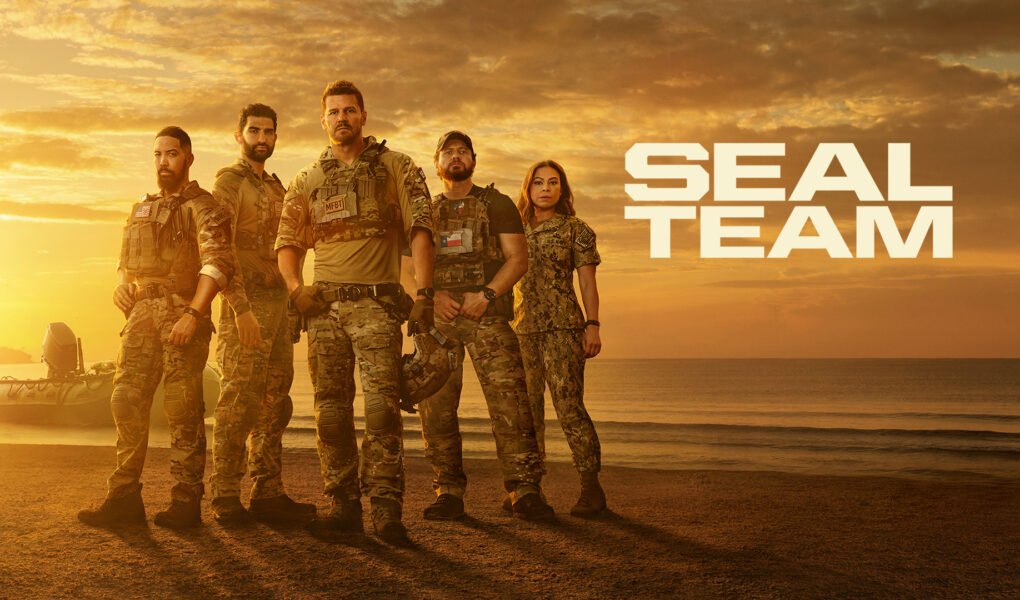Season 7 of SEAL Team isn’t just another chapter—it’s a heartfelt farewell that dives deep into loss, identity, and what it means to carry wounds you can’t see.
A Different Goodbye
When SEAL Team’s seventh season was announced as the final one, it instantly took on a heavier emotional weight. Every mission, every conversation felt like a moment more permanent. The absence of a next season transformed even casual dialogue into emotionally loaded farewells. The characters, long-time companions to loyal fans, were not just operating in war zones—they were saying goodbye to us.
That sense of finality colors the whole season, transforming action sequences into reflections on what’s truly at stake—family, mental health, and the legacy of service. It’s not the firefights or tactical entries that define this season, but the moments in between—the quiet looks, the personal sacrifices, and the long silences after a mission ends.
Jason Hayes: A Man Changed
David Boreanaz plays Jason Hayes, a character whose transformation is both physical and psychological. Now 56 years old, standing at 6′1″, Boreanaz portrays a man wrestling with the invisible toll of war. Jason’s traumatic brain injury (TBI) storyline reaches a heart-wrenching climax as he contemplates stepping away from the battlefield for good. The conflict between duty and healing is no longer theoretical—it’s his daily reality.
What adds more depth is Jason’s relationship with his children. As a single father to Emma and Jaden, we see a side of Jason that is softer and more vulnerable. His moments with Emma, in particular, are tender and real. The once indomitable team leader must now admit that he is human, fragile, and no longer bulletproof. It’s a brave and raw performance by Boreanaz, who himself admitted to undergoing four MRIs in four months during filming.
Ray Perry: From War to Peace
Neil Brown Jr.’s portrayal of Ray Perry gives us another powerful arc. Ray, one of the team’s most spiritual and grounded members, faces a new mission—finding peace. In Season 7, Ray decides to focus on his family and opens a treatment center for veterans. This shift is not a retreat but an evolution. After years of war, his service continues in another form.
The emotional pull of Ray’s story lies in his vulnerability. He’s not just stepping away from combat; he’s stepping into unfamiliar emotional terrain. The weight of leadership, the trauma of past missions, and the responsibility of healing others create a layered and deeply human narrative. His bond with his wife Naima also shines, giving viewers a portrait of strength forged in love and sacrifice.
Sonny Quinn: Grief in Silence
A.J. Buckley’s Sonny Quinn carries grief like body armor—always visible, never discussed. Clay’s death continues to haunt him, and in Season 7, we see how that loss has shaped every facet of his being. Sonny is no longer just the team’s joker or brawler; he’s a man learning to process pain in silence.
In a deeply symbolic scene, Sonny hands over his trident to Lt. Davis. It’s more than a gesture—it’s a moment of surrender and growth. He acknowledges that he needs change, perhaps even peace. These emotional layers add richness to Sonny’s character, showing how even the toughest warriors can be vulnerable.
Lisa Davis & Omar Hamza: Silent Anchors
Toni Trucks, who plays Lisa Davis, brings balance and emotional intelligence to the series. Standing at 5′2½″ and aged 44, Trucks portrays a character that has evolved from a support role into a critical leader. Davis is ambitious, but not at the cost of her humanity. She bears the emotional labor of keeping Bravo operational and grounded.
Omar Hamza, portrayed by Raffi Barsoumian, offers a quieter but equally emotional arc. As the outsider integrating into Bravo, he deals with past trauma and present tension. His storyline is one of redemption and resilience, providing a subtle yet poignant look at how war reshapes identity.
Key Moments That Break You
Several scenes in Season 7 leave a lasting emotional mark. Jason’s vulnerable conversation with Emma about his future is one such moment. It’s not just a father talking to his daughter; it’s a warrior admitting fear and uncertainty. The emotional weight of this scene is magnified by Boreanaz’s understated performance.
Ray’s opening of the veteran clinic is another standout moment. Surrounded by friends and family, Ray finds peace in purpose. The ceremony, though small, feels monumental. It is a declaration that healing is possible, even after years of war.
Themes Woven Through Action
Season 7 masterfully weaves themes of mental health, identity, and sacrifice through its storylines. TBI, PTSD, survivor’s guilt—these aren’t plot devices; they’re lived realities for the characters. This season doesn’t just acknowledge these issues; it centers them.
Family also plays a crucial role. From Jason’s bond with his kids to Ray and Naima’s partnership, the show portrays emotional support systems with nuance. Brotherhood extends beyond the battlefield into these personal, tender relationships.
Behind the Curtain: Crafting Emotion
The emotional intensity of Season 7 is not accidental. Writers, directors, and actors made deliberate choices to focus on character-driven storytelling. David Boreanaz’s physical commitment to the role, despite injuries, speaks volumes about the authenticity of the performance. His experience of filming through pain adds a raw, genuine layer to Jason Hayes.
Cinematography and sound design also contribute to the emotional depth. Long pauses, soft lighting, and a haunting score emphasize the inner turmoil of the characters. The show invites viewers to sit with discomfort, to feel the silence between words.
The Finale: Bittersweet Goodbye
The final episode doesn’t tie up every loose end—and that’s its strength. Life, especially military life, doesn’t offer clean resolutions. Jason’s farewell is quiet, understated, and deeply human. There are no grand speeches, just a man stepping into the unknown with courage.
For fans, the finale feels like a salute—to the characters, to the actors, and to the real-life service members whose stories inspired the series. It’s a respectful and emotionally satisfying conclusion.
Fans and Veterans Respond
Fan reaction to Season 7 has been overwhelmingly emotional. Online forums are filled with gratitude and tears. Many veterans praised the show for its realistic depiction of military mental health struggles, saying it resonated deeply with their own experiences.
David Boreanaz has often shared that receiving messages from veterans has been one of the most meaningful aspects of his role. These genuine connections underscore the importance of emotionally authentic storytelling.
Who Are the People Behind Bravo?
David Boreanaz, now 56, is married to Jaime Bergman and has two children. His net worth is estimated at $30 million. Toni Trucks, 44, is in a relationship with Brandon Phillips and has one child. These real-life details add depth to their portrayals, reflecting their maturity and emotional insight.
Their physical appearances mirror their characters—strong but worn, resilient but tired. This authenticity in casting and performance enhances the emotional gravity of the season.
Final Thoughts: Emotional Resonance Over Explosions
SEAL Team Season 7 proves that true strength lies not just in battle but in vulnerability. It’s a season filled with tears, quiet triumphs, and painful goodbyes. More than any other season, it touches the soul.
This final chapter serves as a tribute—to brotherhood, to sacrifice, and to healing. It’s not just the end of a show. It’s the end of an era, delivered with the kind of emotional honesty that lingers long after the credits roll.
READ MORE : Letflix Review: Pros, Cons, and Alternatives in 2025
FAQs
Why is SEAL Team Season 7 considered the most emotional season?
Season 7 explores the personal toll of war, mental health struggles, and life beyond service. The farewell tone and deeper character arcs make it a powerful emotional experience.
Does Jason Hayes leave the team in Season 7?
Jason contemplates stepping away due to his traumatic brain injury. While he doesn’t have a dramatic exit, his quiet decision marks a major turning point in his journey.
Are any real veterans involved in SEAL Team?
Yes, the series has consulted with and featured real veterans for authenticity. Their influence is evident in the realistic portrayals of trauma, brotherhood, and recovery.
What happens to Ray Perry in the final season?
Ray opens a treatment center for veterans, transitioning from combat to healing. It’s a meaningful evolution of his character and a symbol of hope.
Will there be a spin-off or continuation after Season 7?
As of now, there are no confirmed spin-offs. Season 7 was designed as the final chapter, offering closure while leaving some storylines open-ended.




